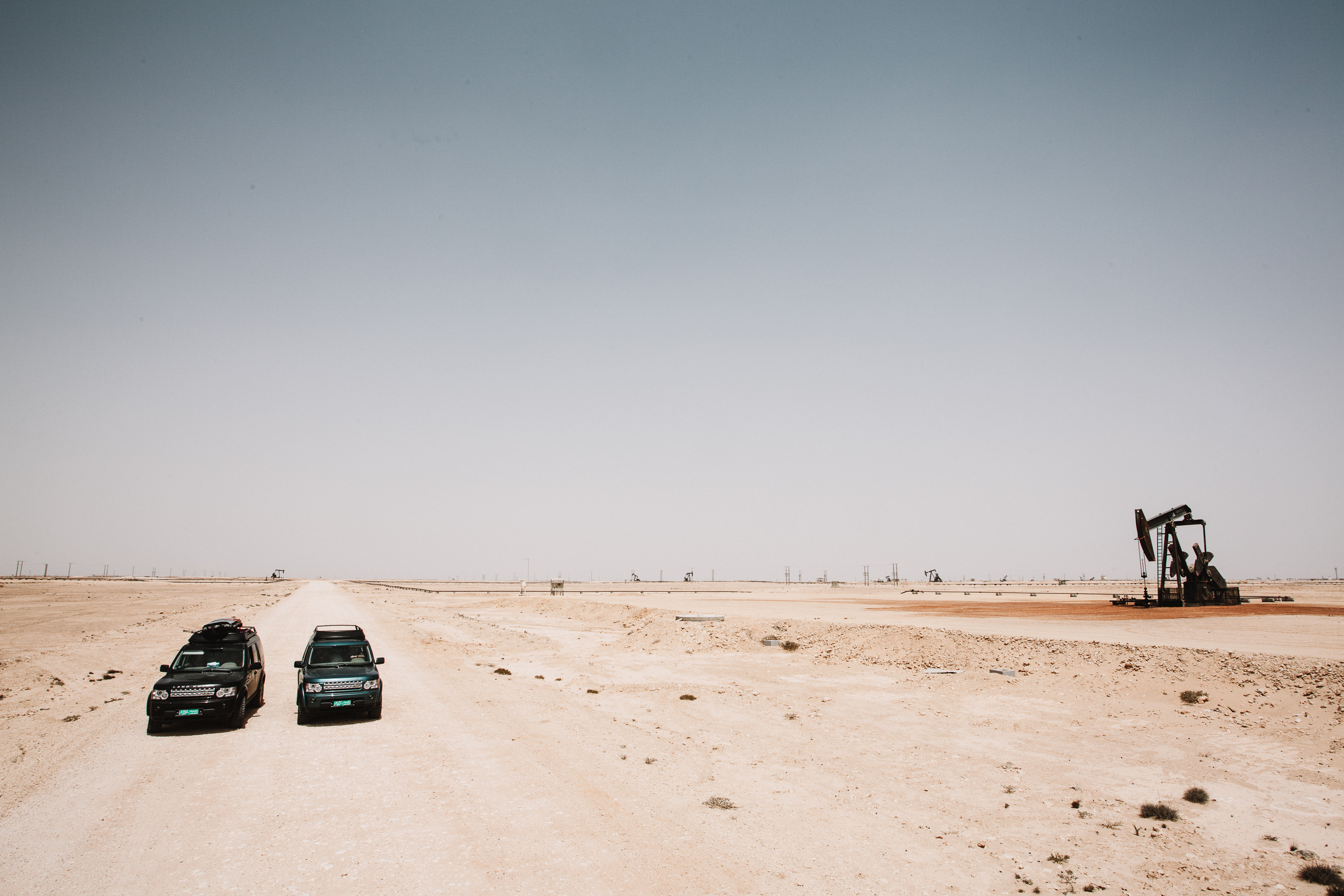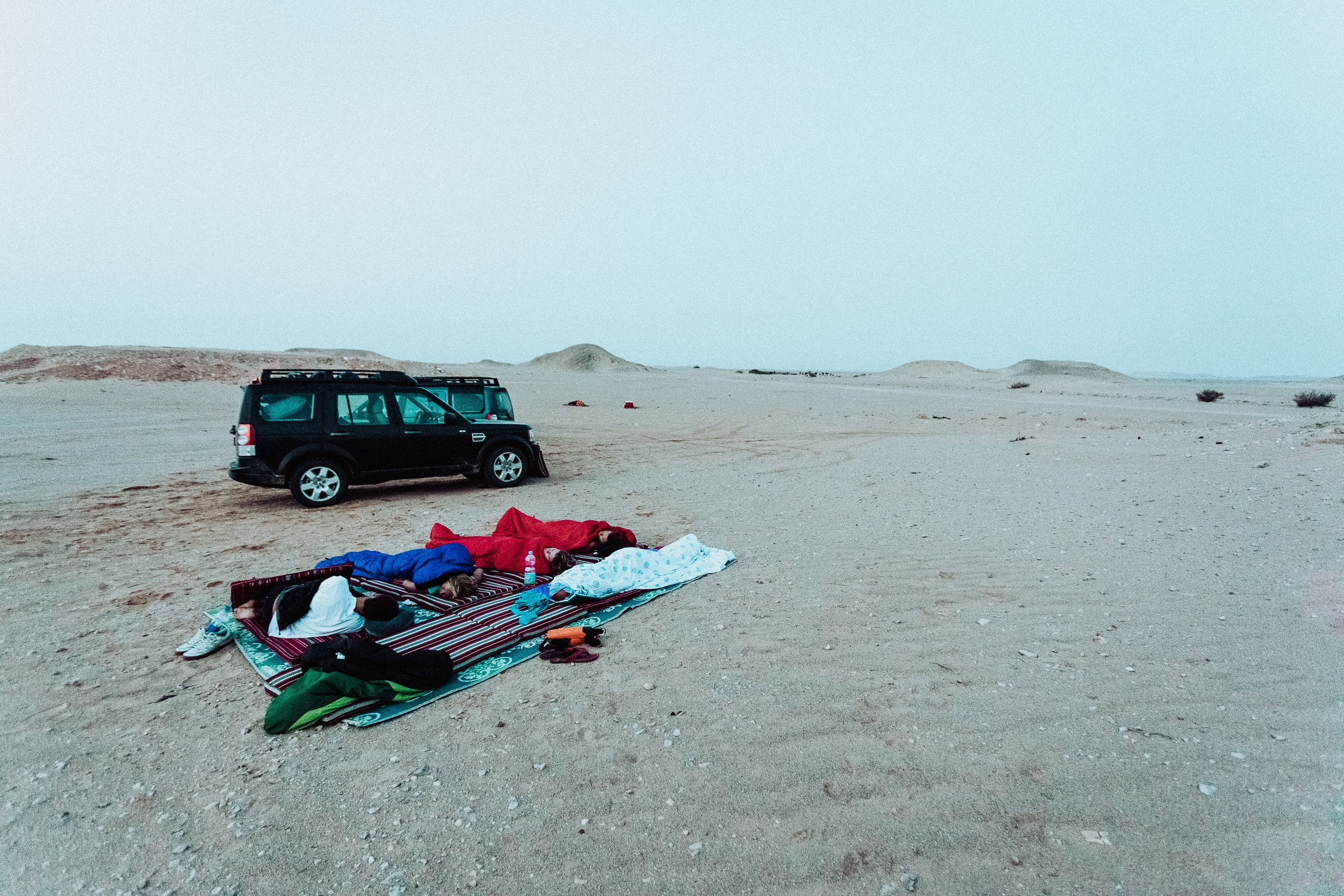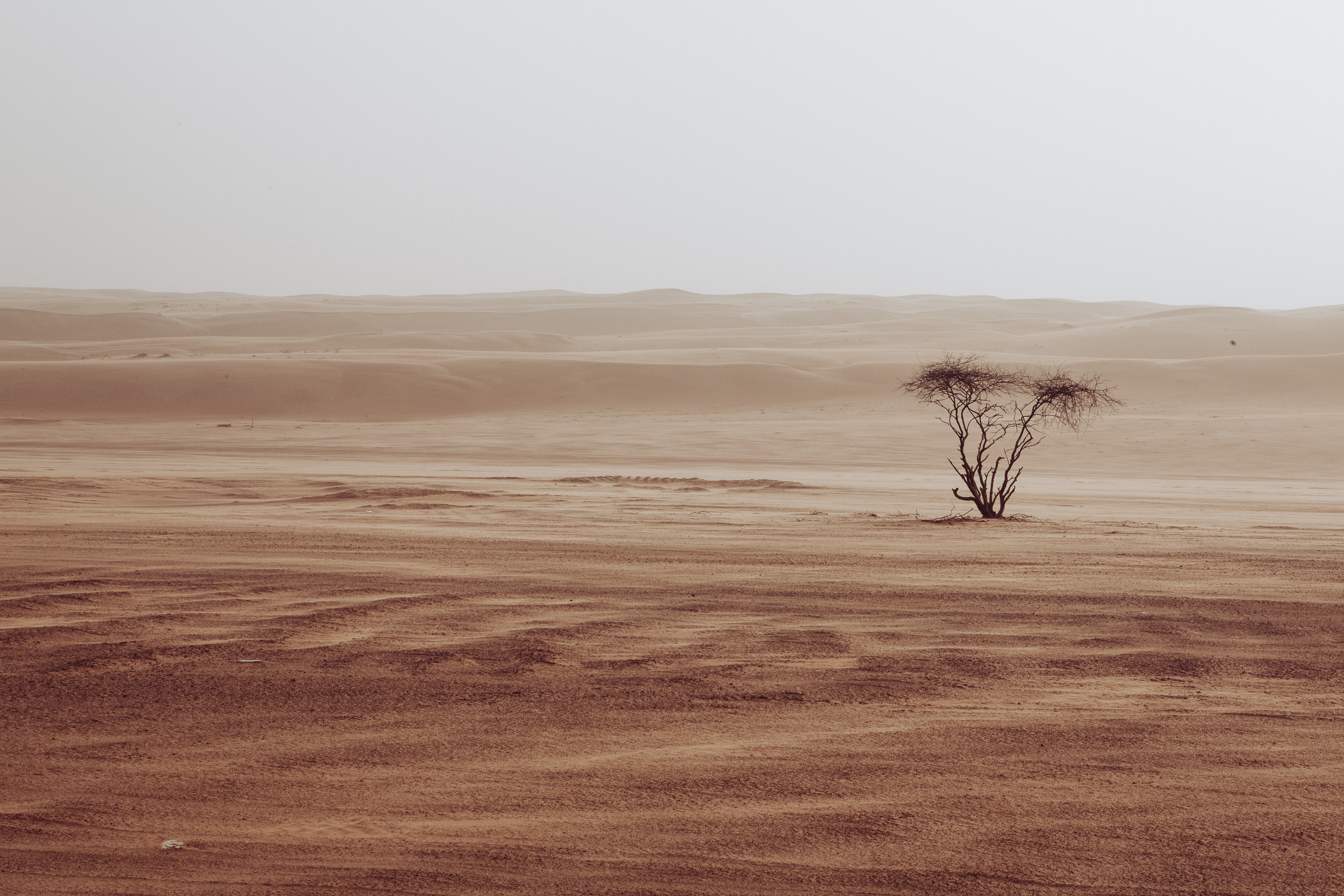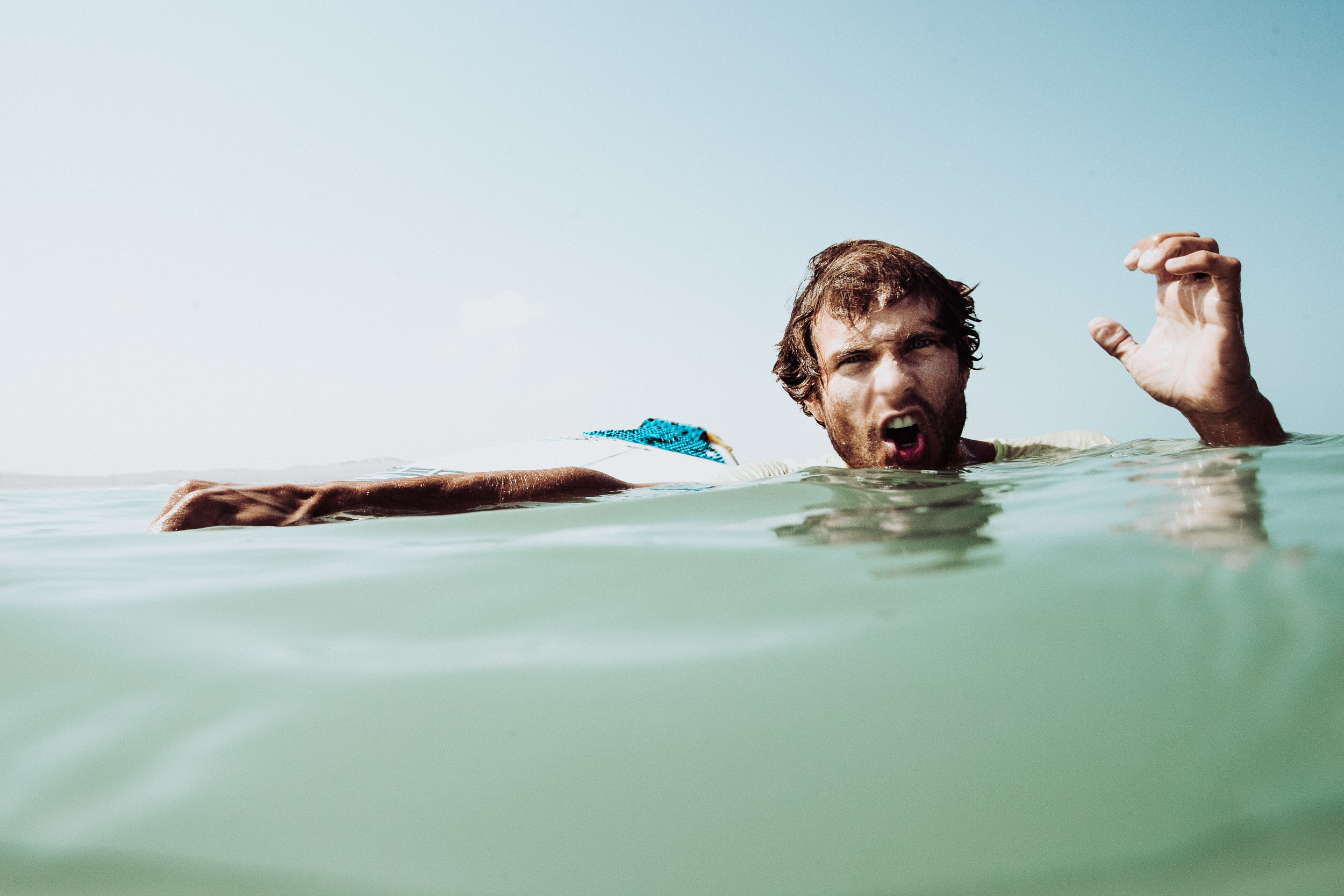Visual stories
Virgins in waiting
The emptiest desert on earth couldn’t keep us at bay

On a searing morning in July 1996, a group of experienced hikers descended into the claustrophobic depths of Snake Gorge. They had come to the remote wadi to go swim-trekking -a rather insane combination of rock climbing and treading the deep, icy waters tracing the bowels of this otherwise bone-dray canyon. The heat was typically vicious, the sky an untroubled blue. This was the day they'd planned for. But by noon, black clouds strangled the sun and rain began tapping the water 400-feet below. Soon after, an avalanche of boulder-laced rapids roared through the gorge, swallowing everything in its path. By nightfall, nine of the hikers were dead and a thick blanket of stars flickered quietly over Arabia. There wasn't a cloud in the sky.
This is Oman. But it isn't.
This is Oman. But it isn't.



It is June 2010. I'm reading the memo that just slipped under my door, which kindly asks all guests of the Grand Hyatt not to go out of doors and stay away from the windows. They could explode, the memo says. I look outside: The seductive blue water tickling the pool bar looks unmolested and tempting. The date palms along the beach are swaying like Polynesians in the mid-morning breeze. I step closer to the window for a better look. A cluster of black clouds is creeping in above the newborn urbanity of Muscat, Oman's capital and largest city. Cyclone Phet is coming.
"Reports from the coast", our guide, Rob Gardner, says after silencing his cell phone for the fifth time in 10 minutes. Our crew is gathered around a table littered with cleared buffet plates, coffee cups, and a sprawling map of Oman.
"Twenty-foot waves are making it to shore", Gardner continues, a bit too anxiously. "The wadis are blowing out. Two people are already dead. We have to change plans".
This is a man who helped pioneer swim-trekking in Snake Gorge and whose "holidays" often consist of two-week jaunts in the Omani desert, where summer temperatures can hit 130 degrees. But Gardner has never led a surf trip before, let alone stared down the barrel of one of the biggest cyclones in Arabian Sea history. Even he -on of the maddest human I have ever met- is at a serious loss.
We all are. No one has attempted a surf trip of this scale in Oman before. A handful of dry-docked weekend surfers working in Dubai and Muscat are our only proof that this place could be holding at least one lonesome siren for the finding. But those surfers have mostly dabbled with the multitude of righthand point breaks along Oman's northeast coast, or ferried over to nearby Masirah Island and its more exposed headlands. Sadly, they're almost always met with fat, windblown "potential" and left to make the long drives home feeling woefully unfulfilled.
Our original plan was to follow these surfer's lead, but with Phet expected to hit any minute now, going with what we know is entirely out of the question.
"So... south", Jesse Hines -who has made a carrier out of chasing and dodging lethal weather- says flatly, while landing a finger on the map tracing a long, long, long line from Muscat into the southernmost Governorate of Dhofar. "Let's go there".
Gardner considers this for a moment and checks his cell phone again. "We can make it there in a day", he says excitedly. "It's a 10-hour shot through the Empty Quarter -but yeah, we can make it".
The rest of our crew consists of Jesse's Outer banks protégé Brett Barley, Spaniard Pablo Gutierrez, Raine Jackson from Oz, and Frenchman Damien Castera. This international team has had three months to think this mission over, yet none among them arrived here with much hope of finding good surf. The consensus was to pack light and go small. Now everyone's talking pintails and death.
Fat white men with red faces talk boorishly with handsome sheikhs styled in well-pressed thaws and thick gold jewelry. Doll-looking Philippine waitresses fill coffee cups and smile uncomfortably, obviously still baffled at how they ended up here in Oman, waiting on oil whores and professional surfers. A probably british girl with milk-white skin is fingering something classical on a midnight-black baby grand upstairs while an Omani hostess bashfully greets suits filtering into a nearby suite with a label above the door that reads: "BP Exploratory Strategies". I note that it's day 42 of the Gulf of Mexico oil leak. The men are laughing and blasé. They are rich.
"Reports from the coast", our guide, Rob Gardner, says after silencing his cell phone for the fifth time in 10 minutes. Our crew is gathered around a table littered with cleared buffet plates, coffee cups, and a sprawling map of Oman.
"Twenty-foot waves are making it to shore", Gardner continues, a bit too anxiously. "The wadis are blowing out. Two people are already dead. We have to change plans".
This is a man who helped pioneer swim-trekking in Snake Gorge and whose "holidays" often consist of two-week jaunts in the Omani desert, where summer temperatures can hit 130 degrees. But Gardner has never led a surf trip before, let alone stared down the barrel of one of the biggest cyclones in Arabian Sea history. Even he -on of the maddest human I have ever met- is at a serious loss.
We all are. No one has attempted a surf trip of this scale in Oman before. A handful of dry-docked weekend surfers working in Dubai and Muscat are our only proof that this place could be holding at least one lonesome siren for the finding. But those surfers have mostly dabbled with the multitude of righthand point breaks along Oman's northeast coast, or ferried over to nearby Masirah Island and its more exposed headlands. Sadly, they're almost always met with fat, windblown "potential" and left to make the long drives home feeling woefully unfulfilled.
Our original plan was to follow these surfer's lead, but with Phet expected to hit any minute now, going with what we know is entirely out of the question.
"So... south", Jesse Hines -who has made a carrier out of chasing and dodging lethal weather- says flatly, while landing a finger on the map tracing a long, long, long line from Muscat into the southernmost Governorate of Dhofar. "Let's go there".
Gardner considers this for a moment and checks his cell phone again. "We can make it there in a day", he says excitedly. "It's a 10-hour shot through the Empty Quarter -but yeah, we can make it".
The rest of our crew consists of Jesse's Outer banks protégé Brett Barley, Spaniard Pablo Gutierrez, Raine Jackson from Oz, and Frenchman Damien Castera. This international team has had three months to think this mission over, yet none among them arrived here with much hope of finding good surf. The consensus was to pack light and go small. Now everyone's talking pintails and death.
Fat white men with red faces talk boorishly with handsome sheikhs styled in well-pressed thaws and thick gold jewelry. Doll-looking Philippine waitresses fill coffee cups and smile uncomfortably, obviously still baffled at how they ended up here in Oman, waiting on oil whores and professional surfers. A probably british girl with milk-white skin is fingering something classical on a midnight-black baby grand upstairs while an Omani hostess bashfully greets suits filtering into a nearby suite with a label above the door that reads: "BP Exploratory Strategies". I note that it's day 42 of the Gulf of Mexico oil leak. The men are laughing and blasé. They are rich.




 Whole towns are submerged in water and wreckage -their residents just emerging to begin the long days and months required to rebuild life. Boats are flipped and strewn sometimes hundreds of yards back from the sea.
Whole towns are submerged in water and wreckage -their residents just emerging to begin the long days and months required to rebuild life. Boats are flipped and strewn sometimes hundreds of yards back from the sea.We are leaving to sleep in the sand.
The plan is to male it to Dhofar's capital city of Salalah in a day, after a brisk bisection of the Rub' al Khali desert, or Empty Quarter. At its most ambitious point -which is where we are heading- the Empty Quarter stretches more than 600 miles long and 300 miles wide -like Death Valley swelled to the size of Montana. If it weren't for the Sahara, this place would be the largest sand desert in the world, but unlike Africa's big beach, the Rub' al Khali is host to almost no permanent civilization; even the Bedouins who have been wandering Arabia since the Stone Age avoid this place like pork.
Ten hours into our lonely plunge we limp into Thumrait, a rightfully forlorn town at the brittle end of the greatest desolation I have ever seen.
Thumrait exists on the map solely because of its Royal Air Force station on the outskirts of town, which happens to be a popular hangout for US military toughs and their fleet of reconnaissance aircraft. At a restaurant Gardner claims as one of his favorites, we dig into (literally-you eat with your hands here) the traditional Sultanate dinner, mambos, and polish off the feast with a few cups of Omani coffee, called khan, which is neither coffee nor tea yet loaded with all the same fun stimulants. We chat cyclonically enhanced tubes and are occasionally interrupted by screaming jet engines launching up into the night. Then we drive off into the hills and make our beds in the sand.
This is what you do in Oman. This place has essentially been an open campsite since antiquity, since Bedouins first recorded traversing the storied sands of the Arabian Peninsula. But it wasn't until 1995 that Sultan Qaboos said to hell with the dark ages and opened up Oman's gates (literally) to the outside world, finally allowing tourists to freely visit his country. Since then Oman has had almost no tourism horror stories (the Snake Canyon tragedy remains the worst by far).
Ironically, Oman is so safe expressly because it is so dangerous. Harmful creatures don't thrive in the intensely moody environment and those that do are so supremely adapted that they don't really give a shit about humans. Even better, the equally adapted Omani people have an uncanny ability to appear out of nowhere -anywhere- just in time to save you from any sort of unacclimated western bravado of which you may be possessed. Outsiders like Rob Gardner have fallen in love with Oman because they've mastered this intricate balance with danger. And also because they are quite nuts.
The plan is to male it to Dhofar's capital city of Salalah in a day, after a brisk bisection of the Rub' al Khali desert, or Empty Quarter. At its most ambitious point -which is where we are heading- the Empty Quarter stretches more than 600 miles long and 300 miles wide -like Death Valley swelled to the size of Montana. If it weren't for the Sahara, this place would be the largest sand desert in the world, but unlike Africa's big beach, the Rub' al Khali is host to almost no permanent civilization; even the Bedouins who have been wandering Arabia since the Stone Age avoid this place like pork.
Ten hours into our lonely plunge we limp into Thumrait, a rightfully forlorn town at the brittle end of the greatest desolation I have ever seen.
Thumrait exists on the map solely because of its Royal Air Force station on the outskirts of town, which happens to be a popular hangout for US military toughs and their fleet of reconnaissance aircraft. At a restaurant Gardner claims as one of his favorites, we dig into (literally-you eat with your hands here) the traditional Sultanate dinner, mambos, and polish off the feast with a few cups of Omani coffee, called khan, which is neither coffee nor tea yet loaded with all the same fun stimulants. We chat cyclonically enhanced tubes and are occasionally interrupted by screaming jet engines launching up into the night. Then we drive off into the hills and make our beds in the sand.
This is what you do in Oman. This place has essentially been an open campsite since antiquity, since Bedouins first recorded traversing the storied sands of the Arabian Peninsula. But it wasn't until 1995 that Sultan Qaboos said to hell with the dark ages and opened up Oman's gates (literally) to the outside world, finally allowing tourists to freely visit his country. Since then Oman has had almost no tourism horror stories (the Snake Canyon tragedy remains the worst by far).
Ironically, Oman is so safe expressly because it is so dangerous. Harmful creatures don't thrive in the intensely moody environment and those that do are so supremely adapted that they don't really give a shit about humans. Even better, the equally adapted Omani people have an uncanny ability to appear out of nowhere -anywhere- just in time to save you from any sort of unacclimated western bravado of which you may be possessed. Outsiders like Rob Gardner have fallen in love with Oman because they've mastered this intricate balance with danger. And also because they are quite nuts.









It's just fast dawn, and our hunt for waves a long wild stretch of beach outside of Salalah is coming along disastrously. The cha-reef, or monsoon, has settled in early. Its winds have already trekked up the Indian Ocean and Arabian Sea, gathering momentum and intense humidity along the way, leaving the sea a violent onshore mess and the day stiflingly hot. In the coming weeks the rains will come to transform Dhofar into a lush oasis, but for now, everything seems suspended in a soupy fatalism.
To make things worse, we are lost. Gardner won't admit it, but, yeah, we're lost. A beaten path is hard to come by in Oman, let alone a highway, and we've long since run out of either one. Gardner slowly leading our caravan of Land Rovers through the desiccated ribs go a sweeping wadi, searching for a way out. The little pixilated arrow on our GPS screen is swimming in a swath of featureless brown and switching directions every few seconds.
"Maybe we should turn around", Pablo suggests from the backseat.
"What for?", Gardner says. "I´ll get us out of here".
As far as Pablo and I can tell, the desert is swallowing us deeper every minute.
"There!" Gardner jams his index finger into the dusty windshield. "A road".
He leads us onto a faint ribbon of track, the lets loose a devious smile. I steal a glance at the GPS and shake my head -we're heading straight toward the sea.
At the end of the road the wind is careening off-shore and the ocean is a radiating blue, its color igniting the Qara Mountains in the distance. What unfolds before us is pure ecstasy.
Head-high right-handers are stripping along the shoreline like gorgeous, blue-eyed twins, triplets, quadruplets. As fas as we know they've been dancing here for eternity, alone and untouched, while their lesser sisters to the north have been teasing surfers for years.
Soon after everyone paddles out, the Bedouins emerge from the searing nothing, presumably to check and make sure we're not in trouble, but then end up taking a seat to watch the show. They cheer when the surfers stroke into each perfect right, disappear into the lengthy tubes, and re-emerge down the point.
Before heading off to round up their camels and goats for the night, they look back to check on us again. They probably think we're a group that's not too many steps from trouble. True or not, it's good to know such genuine people are a few steps closer.
To make things worse, we are lost. Gardner won't admit it, but, yeah, we're lost. A beaten path is hard to come by in Oman, let alone a highway, and we've long since run out of either one. Gardner slowly leading our caravan of Land Rovers through the desiccated ribs go a sweeping wadi, searching for a way out. The little pixilated arrow on our GPS screen is swimming in a swath of featureless brown and switching directions every few seconds.
"Maybe we should turn around", Pablo suggests from the backseat.
"What for?", Gardner says. "I´ll get us out of here".
As far as Pablo and I can tell, the desert is swallowing us deeper every minute.
"There!" Gardner jams his index finger into the dusty windshield. "A road".
He leads us onto a faint ribbon of track, the lets loose a devious smile. I steal a glance at the GPS and shake my head -we're heading straight toward the sea.
At the end of the road the wind is careening off-shore and the ocean is a radiating blue, its color igniting the Qara Mountains in the distance. What unfolds before us is pure ecstasy.
Head-high right-handers are stripping along the shoreline like gorgeous, blue-eyed twins, triplets, quadruplets. As fas as we know they've been dancing here for eternity, alone and untouched, while their lesser sisters to the north have been teasing surfers for years.
Soon after everyone paddles out, the Bedouins emerge from the searing nothing, presumably to check and make sure we're not in trouble, but then end up taking a seat to watch the show. They cheer when the surfers stroke into each perfect right, disappear into the lengthy tubes, and re-emerge down the point.
Before heading off to round up their camels and goats for the night, they look back to check on us again. They probably think we're a group that's not too many steps from trouble. True or not, it's good to know such genuine people are a few steps closer.








Several days later we're rounding the headland of Ras Madrakah and reality is settling in. The coastal highway is buried in sand. Whole towns are submerged in water and wreckage -their residents just emerging to begin the long days and months required to rebuild life. Boats are flipped and strewn sometimes hundreds of yards back from the sea.
We learn that a total of 24 people died in the cyclone, yet no one seems defeated. In Asila -our initial planned destination- a fisherman invites us to his battered home for khan, where we can stay the night if we need. It is coarse and resilient, this relationship the Omani people have forged with their homeland over the centuries. Some storm is hardly enough to change that.
Just north of Asila, the highway has been chewed in half by a gushing wadi, its yellow lines diving off aimlessly into the middy water. Behind us, bent and twisted road signs point toward Muscat. We park and sit in silence, watching little bits of pavement tumble away. We've been gone for two weeks, driven more than 2,500 miles and slept in the sand every night. The heat seems only hot now, not life-threatening. Death is no longer hiding around the next dune. We know there are perfect waves out there waiting for someone to return. You just can't plan shit like that.
We learn that a total of 24 people died in the cyclone, yet no one seems defeated. In Asila -our initial planned destination- a fisherman invites us to his battered home for khan, where we can stay the night if we need. It is coarse and resilient, this relationship the Omani people have forged with their homeland over the centuries. Some storm is hardly enough to change that.
Just north of Asila, the highway has been chewed in half by a gushing wadi, its yellow lines diving off aimlessly into the middy water. Behind us, bent and twisted road signs point toward Muscat. We park and sit in silence, watching little bits of pavement tumble away. We've been gone for two weeks, driven more than 2,500 miles and slept in the sand every night. The heat seems only hot now, not life-threatening. Death is no longer hiding around the next dune. We know there are perfect waves out there waiting for someone to return. You just can't plan shit like that.








Credits
Words by Mr. Andrew Lewis (@andrewslewis1)
Production: Mark Eveleigh (The Wideangle)